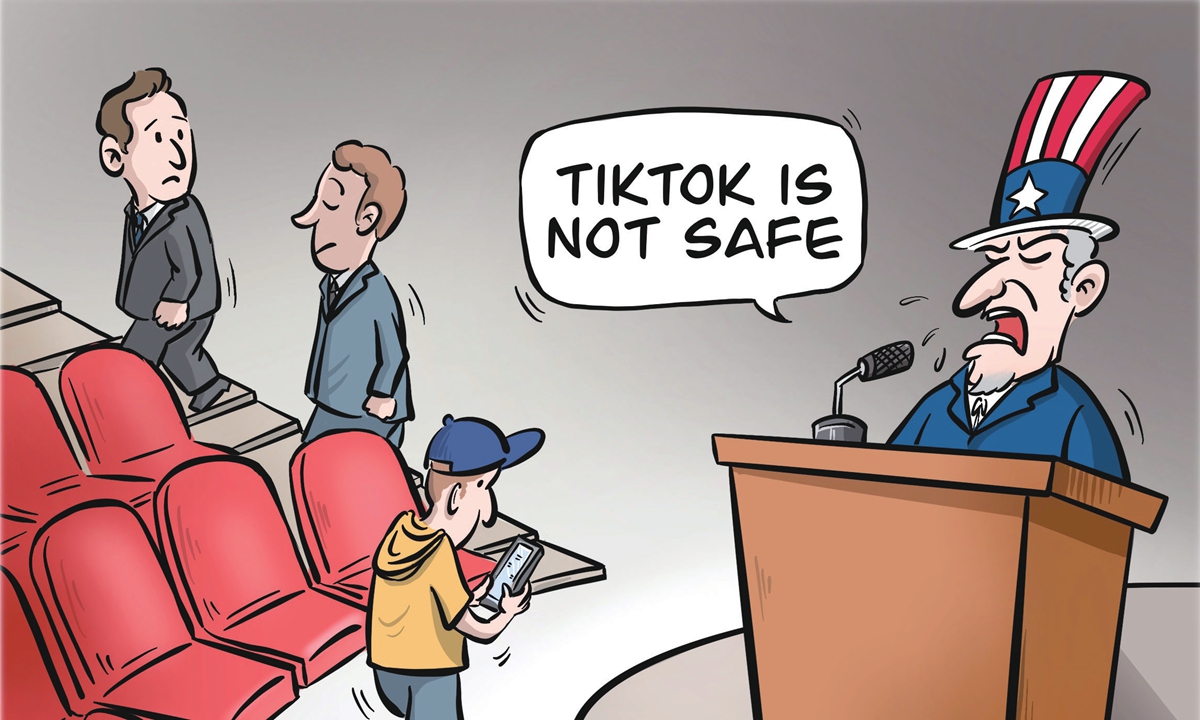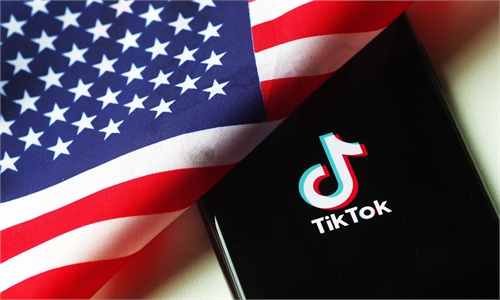
Illustration: Liu Xidan/GT
Washington politicians have repeatedly told American audiences that TikTok is not safe. Meanwhile, state governments have sought to ban the popular app, however, in doing so they have shown no interest in following the First Amendment and its provisions relating to free speech. In one case, a federal judge told Montana officials that preventing people from using the app in that state "oversteps state power" and "likely violates the First Amendment."Before we go any further, let's not mince words here: The hatred of TikTok emanating from federal and state halls of power has nothing to do with privacy or any other issue politicians want to offer. It has everything to do with where TikTok calls home. Because it is owned by a Chinese entity, it is automatically dangerous in the eyes of elected officials. American politicians are simply doing what they know how to do: Validate being tough on China by criticizing a popular app.
Imagine such a politician saying that Meta, the company that operates Facebook and Instagram, ought to be banned because of its questionable privacy practices. As the Guardian noted earlier this year, Meta collects GPS locators, photos taken by users, WiFi information and more, meaning it "can paint an extremely detailed and intricate map of people's lives..." But, of course, because Meta is an American company, it gets a pass. Let's not forget that Facebook is more than willing to hand over information whenever the federal government wants it. We will understand why that is important in just a few paragraphs.
The American people have heard politicians from Washington and across the country rail against TikTok. But they do not believe them. A new survey from the Pew Research Center reports that only 38 percent of US adults support banning the app. That figure was 50 percent just a few months earlier. And outright opposition to banning TikTok went up in that same time frame, from 22 percent to 27 percent.
Perhaps more importantly, 50 percent of US teenagers do not want to see the app banned, and that percentage swells to 68 among teenagers who regularly use TikTok. The impression of TikTok among teenagers matters because another Pew Research Center study found that it is the second most-popular app in that age bracket. According to Pew, "58 percent of teens are daily users of TikTok. This includes 17 percent who describe their TikTok use as almost constant."
Finally, when you also take into account the fact that the percentage of Americans who report getting their news from TikTok has quadrupled since 2020, there are at least three conclusions that can be drawn: Americans like TikTok; they use it regularly; and they want access to it.
The Washington political establishment went bonkers earlier this year in an effort to kill off TikTok. The US politicians from the left to the right began screaming the same message: TikTok's parent company would share the data on its American users with the Chinese government. Such data could include a person's browsing history, location and so-called biometric (ie facial mapping or retina scans) data. Before we go any further, keep the following statement in mind: TikTok's CEO made clear no data has been - or would be - shared with the Chinese government.
Similar fears were expressed in Canada, where a TikTok official eventually told the Canadian parliament, "The Chinese government has not asserted the rights over any TikTok user data."
What does Meta's Mark Zuckerberg think about that?
Washington politicians have had nothing to say about the aforementioned Pew Research Center study on TikTok, but one is left to wonder if Republicans will take another stab at banning the app in 2024. Why? Remember, the vast majority of TikTok's users are in their teens, and teens generally vote for Democratic, liberal or progressive causes. Left-leaning groups sought to align with young TikTok influencers leading up to the 2022 midterm elections. One can reasonably expect they will try again in 2024, when control of the White House and both houses of Congress are up for grabs.
Republicans will fail in such attempts, but then again common sense rarely is on display in Washington. The American public knows this. Just ask the millions of them who are on TikTok.
The author is an associate professor at the Department of Communication and Organizational Leadership at Robert Morris University. opinion@globaltimes.com.cn



